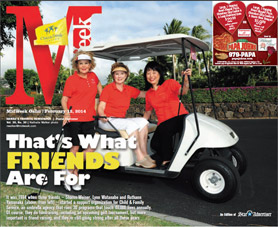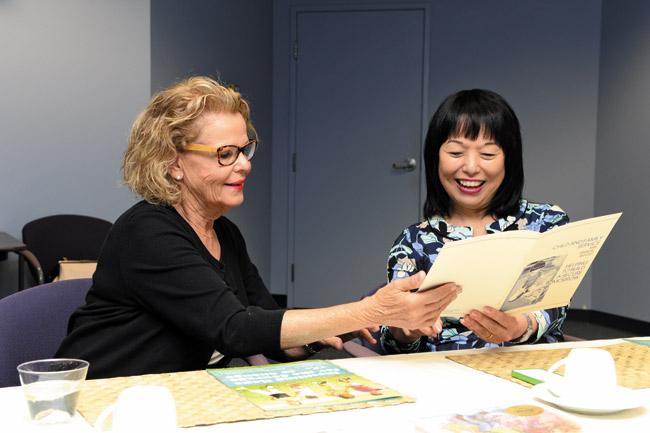That’s What Friends Are For
It was 1984 when three friends – Lynn Watanabe, Ruthann Yamanaka and Sharon Weiner – started a support organization for Child & Family Service, an umbrella agency that runs 30 programs that touch 40,000 lives annually. Of course, they do fundraising, but more important is friend-raising, and they’re still going strong
Strengthening families and fostering the healthy development of children.
These are the words written on the walls of the CFS Ewa Family Center – and in the hearts of each and every volunteer who helps in that mission. It is this simple command that drew together three of Honolulu’s most-esteemed and powerful women 30 years ago to see how they could help.
Lynn Watanabe, Sharon Weiner and Ruthann Yamanaka were friends in 1984, but came from disparate parts of the community: Yamanaka from the banking side, Weiner a celebrated mover in the world of public relations, and Watanabe a housewife, whose husband happened to be influential lawyer Jeff Watanabe.
Yet these three got together at the urging of Jeff and Ruthann’s husband Gregg to help create a volunteer vehicle that could raise money for Child & Family Service.
This was a new venture for the charity, despite being around since 1899, when it had been known as Associated Charities of Honolulu. Prior to this, its support had come from the government for the services it provided to people of all ages and walks of life.
For those unfamiliar with CFS, it runs more than 30 programs on all six major islands that help abused men, women and children, providing alternate education and services that range from the womb to the grave. CFS estimates it touches 40,000 lives each year, and therefore was an easy choice for a charitable gift. But there was no mechanism for such giving in 1984 – even after seven decades of service to the community.
The event that spawned what was to become known as CFS Guild was the opening of Ryan’s Grill at Ward Centre. As is often tradition in Hawaii, the restaurant wanted to open its doors with a fundraiser and was seeking a worthy charity. Gregg Yamanaka suggested CFS, and the restaurant jumped at it, but CFS had no way of organizing such an event.
That is where this trio, along with seven other volunteers, got together and formed the guild to serve as the fund- and awareness-raising arm of CFS. This opening, along with these three women’s connections in the community, led to fundraising openings at Roy’s, Kahala Mandarin, AMC Cruise Line and Hard Rock Café over the next several years.
“What made it fun and worth it was because it was such a great product,” says Yamanaka, who now serves as senior vice president of human resources and planning at Outrigger Enterprises Group. “CFS is so well-organized; it had wonderful programs. It was one of those entities that you could truly go out and say, ‘You’ve got to give to this group because they are great.'”
New-business openings were a great way to raise some money, but these women were not the type to sit around and wait for things to happen to them. They hatched the idea for a golf tournament, but they needed someone powerful to get behind it to start the momentum.
They decided upon John Bellinger, former president of First Hawaiian Bank, and it was Watanabe who – after a couple of glasses of liquid courage – approached Bellinger at a rooftop party at the old First Hawaiian building. Her forwardness was rewarded and Bellinger took to the idea, even going so far as to propose they have the teams be made up of couples, an idea that even in the 1980s was considered unusual.
Watanabe got this first lead for the guild, but they sent in Weiner to close it, and she remembers quite vividly the night she and Bellinger hammered out the details to what would be named the CFS Child’s Play Golf Tournament.
“This guy was the most formidable business executive – very local, very powerful, didn’t smile too much,” recalls Weiner, the former global vice president for DFS Group. “But he couldn’t have been nicer to me. You had to drink bourbon, and I ate pickled green mango. So I am eating something I really had trouble eating and drinking something I really don’t like, but we put it all together while he sat in his easy chair watching the news. But he was the impetus and he sold the teams.”
In the first year of the tournament they raised $12,000, a noble enough beginning, but it has now grown so much in popularity that last year it brought in $200,000 to the guild.
This relationship with Bellinger was the beginning of a new method for bringing gifts into CFS – they described it not as fundraising but “friend-raising.”
“There was a thought back then, instead of raising money, ‘raising friends,’ because CFS was the largest social service agency but nobody knew about it,” says Watanabe.
So by raising awareness of the organization, making new “friends,” you would bring people in who eventually would want to contribute to the guild.
They sponsored events such as “Family of the Year,” where they recognized an ohana in the community that was running their family the right way, and celebrated them at a dinner in their honor. This night would raise zero dollars for the guild, but it did raise its profile in the community, called attention to the important work it does and helped grow that circle of friends.
“Being a friend means you have knowledge of the mission and the work of the organization; you have the credibility of knowing how it is managed, you know the volunteers are going to come do their job,” explains Weiner. “It is a familiarity with the organization, so that when there are a panoply of options, you go with CFS as the option you would recommend.”
Friend-raising has worked. Once supported almost 100 percent by government contracts, CFS had cut that number by 8 percent in 2006, when CEO Howard Garval joined the team. It now boasts almost 20 percent of its revenues comes from non-government sources.
“Most nonprofit organizations would give their first child to have a guild like ours to raise money. We are very, very blessed,” says Garval. “We can’t do what we do without the guild.
“If you had to staff our two biggest fundraisers, the golf tournament and the fall gala, it wouldn’t make sense to do them. We are blessed with a group of volunteers, many of whom have been with the guild for so long, and they are doing this work out of the kindness of their hearts and their commitment to CFS. Not only that, but I remember when I first came here and they had my first golf tournament, and I thought it was really nice, but I didn’t realize that we had professional event planners. I was in awe of what they can do.”
The gala Garval is referring to is another creation by the guild that has begun to dwarf even its golf tournament. Last year alone it raised just short of $600,000 for CFS and featured 21 leaders from the business community performing songs by KC and the Sunshine Band on stage at the Convention Center.
The focus of the gala follows that basic tenet of the guild: Build friendships, have fun and the rest will follow.
“I have been on I don’t know how many boards of directors of nonprofits, Stadium Authority and HTA,” says Weiner, “but for me, what was wonderful was working with a group and getting something done.
“You didn’t sit through a lot of meetings; there wasn’t a bunch of meetings and bylaws and BS, but we got things done. You could furnish an apartment, we could put together a golf tournament, and you didn’t have to worry about notes or who was looking over your shoulder and all that garbage that comes with a board. It was so much fun to just get something done for a really good cause.”
Sometimes just making friends makes the best financial sense of all.







